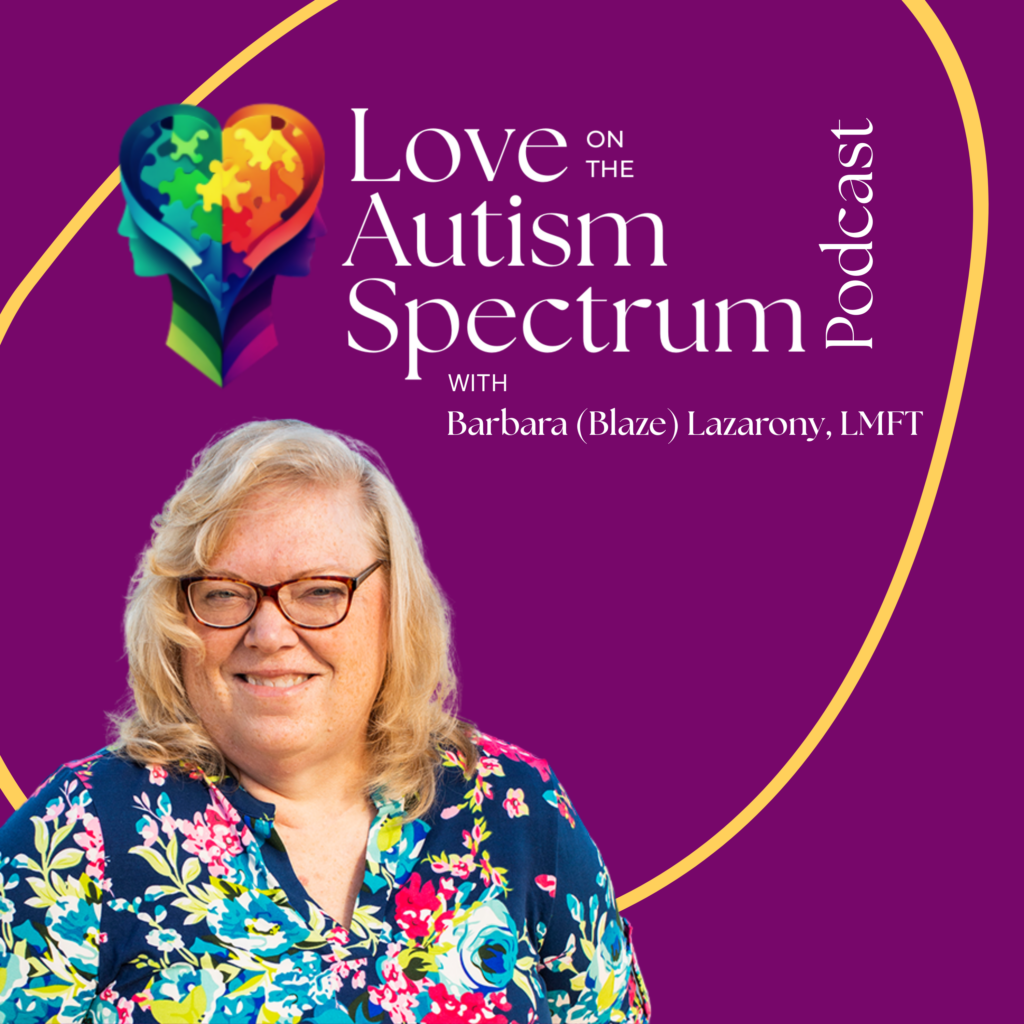Embracing the Power of Emotional Intimacy in Autistic Adults
Emotional intimacy is the backbone of any thriving relationship, especially for an autistic adult. Yet, it remains an elusive concept for many neurodiverse couples, people with Autism Spectrum Disorder, Attention-Deficit Hyperactivity Disorder (ADHD), and Complex Trauma. Unlocking the power of emotional intimacy means creating deeper connections through trust, vulnerability, and open communication. In this comprehensive guide, you will discover the essential components of emotional intimacy and practical strategies for enhancing this vital aspect of your neurodiverse relationships.
Key Takeaways
- Build emotional intimacy through communication, trust, and empathy for a deeper connection.
- Express appreciation, share experiences, and spend quality time together to strengthen your neurodiverse bond.
- Seek professional help if needed to overcome barriers & create a resilient relationship.
Understanding Emotional Intimacy
Emotional intimacy is a powerful bond between two individuals in various relationships, including family, friends, and romantic partners. This profound tie encourages trust, vulnerability, and openness, facilitating open communication and reciprocal vulnerability. It is a cornerstone for constructing a resilient relationship and paving the way for a fulfilling union.
While thoughts of intimacy often gravitate towards physical touch and sexual encounters, emotional intimacy transcends these aspects, especially in neurodiverse relationships, forging an enduring connection that anchors thriving partnerships. It’s the foundation upon which healthy relationships are built and is crucial in evaluating and nurturing romantic connections.
Autistic adults often face unique challenges in adult relationships, emphasizing the need for straightforward communication to navigate social interactions and build emotional connections.
The Role of Emotional Intimacy in Romantic Relationships
Emotional intimacy is key in a romantic relationship, nurturing an environment of safety, satisfaction, and support. The cultivation of emotional intimacy enables couples to solidify their bond and revel in increased happiness within their union. The establishment of this deep connection hinges on the following:
- Open communication
- Trust
- Vulnerability
- Empathy
A person with autism spectrum disorder will have unique communication styles and emotional experiences, especially in romantic contexts, requiring both partners to understand and adapt.
These are fundamental elements of content emotional intimacy.
Emotional intimacy can be enormously rewarding. It enables partners to forge deeper connections, express their feelings and thoughts candidly, and enjoy enhanced security and support. By working together and seeking professional help when necessary, couples can effectively strengthen their emotional intimacy, leading to a more fulfilling and resilient relationship.
Emotional Intimacy vs. Sexual Intimacy
While emotional accessibility and sexual intimacy are interconnected, a healthy sex life can contribute to emotional intimacy, making it essential for a deeper connection and more fulfilling sexual experiences.
Emotional intimacy means sharing your deepest thoughts, feelings, and vulnerabilities with your partner, creating a solid emotional connection. This connection forms the foundation for a healthy relationship and enhances intimate and sexual relationships, ultimately leading to more satisfying and meaningful connections.
Emotional intimacy is pivotal for a thriving marriage and nurtures romantic relationships. By fostering emotional intimacy, couples can create a strong foundation for a lasting and fulfilling partnership, which ultimately impacts their sexual connection and overall happiness in their relationship.
Building Emotional Intimacy: Key Components
The construction of emotional intimacy calls for time, patience, and effort, yielding rewards that far outweigh the investment. By understanding the critical components of emotional intimacy, neurodiverse couples can work together to strengthen their emotional connection and create a more fulfilling partnership. These key components include:
- Communication
- Trust
- Vulnerability
- Empathy
- Emotional support
Focusing on these components can help couples build a strong foundation of emotional intimacy. These indispensable elements contribute to the development of emotional intimacy and underpin the preservation and enhancement of the profound bond between romantic partners. As couples work on these components, they will be better equipped to navigate the challenges that inevitably arise in relationships and create a robust and lasting connection.
Communication and Active Listening
Open communication and active listening, pioneered by Harville Hendrix, are vital for understanding and connecting with your neurodiverse partner on a deeper level. Communication is the foundation of building trust and fostering emotional intimacy, as it allows both partners to:
- Express their thoughts
- Express their feelings
- Express their desires
- Share their experiences
- Share their concerns
- Share their dreams
Open and honest communication can strengthen your neurodiverse relationship and deepen your partner’s connection. Body language and tone of voice can also be crucial in communication. Be mindful of your partner’s nonverbal cues, as they may have difficulty expressing themselves verbally.
In addition to open communication, active listening is equally important. This involves giving your partner your full attention and genuinely understanding their perspective without judgment or interruption. Active listening shows that you care about what your partner has to say and validates their feelings and experiences.
It’s essential to remember that neurodiverse individuals may communicate differently than neurotypical individuals. They may struggle with processing information quickly or conveying their thoughts and emotions in a way that others can easily understand. As a neurotypical partner, being patient and understanding is essential while actively working on improving communication skills.
Honest communication happens when people actively listen and genuinely understand one another. By practicing active listening and engaging in meaningful conversations, couples can create an environment where both partners feel comfortable sharing their innermost thoughts and emotions, ultimately enhancing their emotional connection and intimacy.
Tips for Effective Communication with an Autistic Partner
Effective communication is key to any successful relationship, and this is especially true when one partner is autistic. Here are some tips for effective communication with an autistic partner:
- Be clear and direct: Autistic individuals often prefer straightforward communication, so avoid using sarcasm or idioms that may be confusing.
- Use visual aids: Many autistic individuals are visual thinkers, so using visual aids like diagrams or pictures can help communicate complex ideas.
- Be patient: Autistic individuals may need more time to process information, so be patient and don’t interrupt.
- Avoid assumptions: Don’t assume you know what your autistic partner is thinking or feeling. Instead, ask open-ended questions to encourage them to share their thoughts and feelings.
Vulnerability and Trust
Vulnerability and trust are essential elements that empower partners to share their innermost thoughts and feelings without judgment or rejection. By being open and vulnerable with one another, couples can build trust and security within their relationship, creating a space for them to express themselves freely and honestly.
For individuals on the autism spectrum, sexual and intimate relationships can present unique challenges due to sensory sensitivities and difficulties in social interactions.
Overcoming barriers to vulnerability may involve addressing past experiences, exploring personal fears, and building trust with your partner. As couples become more comfortable with vulnerability, their emotional connection deepens, and their relationship becomes more fulfilling and resilient.
An autistic person may struggle with vulnerability due to difficulties in understanding and expressing emotions. However, by working together and communicating openly, an autistic person and their partner can overcome these barriers and create a strong emotional connection.
Intimacy is another crucial aspect of a fulfilling relationship. It involves sharing physical touch, emotional closeness, and personal experiences with your partner. Intimacy allows couples to feel connected and supported, both physically and emotionally.
For individuals on the autism spectrum, intimacy may look different than traditional notions of physical touch. It could involve sensory experiences such as hand-holding or cuddling while watching a movie. For some, it may be about deep conversations or shared interests that create an intimate bond.
Creating a Safe Space for Emotional Expression
Creating a safe space for emotional expression is crucial for any relationship, but it’s especially important when one partner is autistic. Here are some tips for creating a safe space:
- Be non-judgmental: Create a space where your autistic partner feels comfortable expressing their emotions without fear of judgment.
- Use positive language: Use positive, affirming language to encourage your autistic partner to express their emotions.
- Be patient: Emotional expression can be challenging for autistic individuals, so be patient and don’t rush the process.
- Offer choices: Offer your autistic partner choices, such as where to sit or what activity to do, to help them feel more in control.
Empathy and Emotional Support
Empathy and emotional support are vital in creating an environment where partners can freely express themselves and feel acknowledged. By demonstrating empathy and providing emotional support, neurodiverse couples can validate each other’s feelings and create a secure and supportive environment for open communication.
Practicing empathy and offering emotional support can be achieved through:
- Active listening
- Openness
- Trust
- Sharing personal experiences and feelings
By embracing these practices, couples can foster a deep emotional connection and cultivate a strong, lasting bond that will ultimately enhance their overall relationship satisfaction and contribute to a healthy marriage.
Practical Strategies for Enhancing Emotional Intimacy
Enhancing emotional intimacy in a relationship need not be intimidating. By applying practical strategies such as sharing personal experiences and feelings, spending quality time together, and expressing appreciation and affection, couples can strengthen their emotional connection.
They slipped briskly into a intimacy from which they never recovered. –F. Scott Fitzgerald
It is important to remember that building emotional intimacy is an ongoing process that requires consistent effort and commitment from both partners. By being proactive and intentional in their efforts to build emotional intimacy, couples can create a strong foundation for a loving, lasting partnership.
Sharing Personal Experiences and Feelings
Opening up about your thoughts and emotions is crucial for deepening emotional intimacy and ensuring a strong connection with your partner. By sharing your experiences and feelings, you allow your partner to understand better who you are and what matters most to you, ultimately fostering trust and intimacy within your relationship.
To effectively share personal experiences and feelings, it is essential to be open and honest, actively listen, and express appreciation and affection. By creating a safe and supportive environment for sharing, couples can strengthen their emotional bond and enhance their understanding of one another.
Quality Time and Shared Activities
Engaging in shared activities and spending quality time together is a powerful way to strengthen emotional bonds and foster intimacy. By setting aside dedicated quality time for one another and participating in activities that both partners enjoy, couples can create lasting memories and reinforce their emotional connection.
Some examples of shared activities that can help enhance emotional intimacy include:
- Going on walks
- Playing board games
- Cooking meals together
- Engaging in meaningful conversations
By being fully present and engaged in these activities, couples can create an environment that nurtures emotional intimacy and fosters a deeper connection between partners.
Expressing Appreciation and Affection
Regularly expressing appreciation and affection, two of the five A’s shared by Dr. David Richo, is essential for maintaining a strong emotional connection and reinforcing feelings of love and support within relationships. Couples can help each other feel valued and esteemed by demonstrating gratitude and affection for one another, ultimately strengthening their emotional bond.
Expressing appreciation and affection can be as simple as offering encouragement, giving a hug or a kiss, or performing thoughtful acts of kindness. Incorporating these expressions into your daily routine can help nurture emotional intimacy and create a lasting bond with your partner.
How Autism Affects Intimacy in Sexual Relationships
Autism can affect intimacy in sexual relationships in a variety of ways. Here are some common challenges:
- Sensory sensitivities: Many autistic individuals have sensory sensitivities that can make physical intimacy uncomfortable or overwhelming.
- Difficulty with social cues: Autistic individuals may have difficulty reading social cues, which can make it challenging to navigate intimate and sexual relationships.
- Emotional regulation: Autistic individuals may have difficulty regulating their emotions, which can make it challenging to navigate intimate and sexual relationships.
- Communication challenges: Autistic individuals may have difficulty communicating their needs and desires, which can make it challenging to navigate intimate and sexual relationships.
By understanding these challenges and working together to overcome them, autistic individuals and their partners can build strong, healthy relationships that are fulfilling and rewarding for both parties.
Recognizing and Addressing a Lack of Emotional Intimacy
Recognizing and addressing a deficit in emotional intimacy is vital to safeguard the health and longevity of your relationship. By identifying signs of emotional distance and working together to overcome barriers to connection, couples can build a stronger foundation for emotional intimacy and ultimately enhance the overall quality of their relationship.
Sensory sensitivities and social cue misinterpretations can significantly affect the ability of autistic individuals to engage in sexual relationships. These challenges, such as sensory overload and difficulty in nonverbal communication, can complicate intimacy and require a deeper understanding of intimacy’s emotional, cognitive, and physical aspects.
It is important to remember that emotional intimacy is a dynamic process, and challenges may arise at various points throughout a relationship. By proactively addressing these challenges and seeking professional help from a neurodiverse therapist like myself, neurodiverse couples can effectively work through difficulties and foster a stronger, more resilient bond. Evaluating romantic relationships is an essential part of this process.
Signs of Emotional Distance
Signs of emotional distance in a relationship may include a lack of communication, withdrawal, or an unwillingness to share personal thoughts and feelings. Recognizing these signs is crucial for understanding the current state of your relationship and identifying areas where emotional intimacy may need to be strengthened.
By acknowledging signs of emotional distance and proactively addressing them, couples can work together to overcome barriers to emotional intimacy and create a stronger, more resilient bond. This may involve improving communication skills, addressing trust issues, or seeking professional help to address underlying concerns.
Overcoming Barriers to Emotional Intimacy
Overcoming barriers to emotional intimacy may involve addressing trust issues, improving communication skills, or seeking professional help through couples therapy. By working together to tackle these challenges, couples can create a more secure and supportive environment for nurturing emotional intimacy and fostering a more profound connection.
Couples need to be proactive in addressing barriers to emotional intimacy, as this will help ensure the health and longevity of their relationship. By being open, honest, and committed to working through these challenges, couples can create a strong foundation for a loving, lasting partnership.
Seeking Professional Help for Emotional Intimacy Issues
For couples struggling to establish a deeper connection, seeking professional aid for emotional intimacy issues can prove beneficial. Couples therapy can provide guidance and support for improving communication, trust, and emotional connection within a relationship, helping couples overcome challenges and create a stronger, more resilient bond.
Finding the right therapist involves considering experience, approach, and compatibility with both partners’ needs and preferences. By selecting a therapist who is well-equipped to address your relationship’s unique challenges and dynamics, couples can maximize the benefits of therapy and work together to create a more fulfilling, emotionally intimate partnership.
Intimacy is not something that just happens between two people; it is a way of being alive. At every moment, we are choosing either to reveal ourselves or to protect ourselves, to value ourselves or to diminish ourselves, to tell the truth or to hide. To dive into life or to avoid it. Intimacy is making the choice to be connected to, rather than isolated from, our deepest truth at that moment.
–Geneen Roth
Benefits of Neurodiverse Couples Therapy
Couples therapy can offer vital guidance and support to those striving to enhance their emotional intimacy and fortify their relationship, especially for neurodiverse couples. Some benefits of couples therapy include:
- Enhancing communication skills
- Resolving areas of concern in the relationship
- Gaining a deeper understanding of relationship dynamics
- Gaining insight into personal contributions to problems
By participating in neurodiverse couples therapy, partners can work together to address challenges, improve their emotional connection, and create a more secure and supportive environment for nurturing emotional intimacy. This ultimately leads to a stronger, more resilient relationship built on trust, openness, and emotional support.
Finding the Right Therapist
Identifying a suitable therapist for neurodiverse couples therapy constitutes a vital step toward resolving emotional intimacy issues and nurturing a profound connection in your relationship. Factors to consider when choosing a therapist include:
- Their experience
- Credentials
- Approach to Therapy
- Compatibility with both partners’ needs and preferences
To find the right therapist, couples can:
- Research therapists in their area who specialize in couples therapy
- Ask for recommendations from trusted sources
- Schedule an initial introductory chat to assess compatibility
- Reach out to a specialist in neurodiversity; I am such a therapist.
By selecting a therapist who is well-equipped to address your relationship’s unique challenges and dynamics, couples can maximize the benefits of therapy and work together to create a more fulfilling, emotionally intimate partnership.
Summary
Emotional intimacy is the key to a strong, lasting neurodiverse relationship and fostering a deep emotional connection, which requires ongoing effort and commitment from both partners. By understanding the essential components of emotional intimacy, implementing practical strategies for enhancing connection, recognizing and addressing a lack of emotional intimacy, and seeking professional help when necessary, couples can build a resilient, fulfilling partnership. A neurodiverse relationship built on trust, vulnerability, and open communication. Remember that emotional intimacy is a journey, not a destination, and nurturing this vital aspect of your relationship will lead to deeper connections and lasting happiness.
Frequently Asked Questions
What are emotional intimacy examples?
Emotional intimacy examples include feeling safe sharing your innermost thoughts and feelings with your partner, wanting to make them happy, feeling a strong connection to their well-being, and frequently daydreaming about being with them.
What are the four types of emotional intimacy?
Intimacy is an essential component of all solid relationships, especially neurodiverse relationships. The four main types of intimacy are emotional, physical, mental, and spiritual. Developing all four can help bring couples closer together and ensure a stronger relationship. With the proper support, couples can cultivate these bonds and strengthen their connection.
How can I be emotionally intimate with someone?
Be present, invest in yourself and your partner, practice curiosity, create a list of positive things about your partner, and have a brave heart – these are all great ways to foster emotional intimacy.
How is emotional intimacy different from sexual intimacy?
Emotional intimacy focuses on the emotional connection and sharing of thoughts and feelings, while sexual intimacy involves physical touch and experiences to foster closeness between two partners. This distinction creates a unique and fulfilling connection that enriches relationships.









